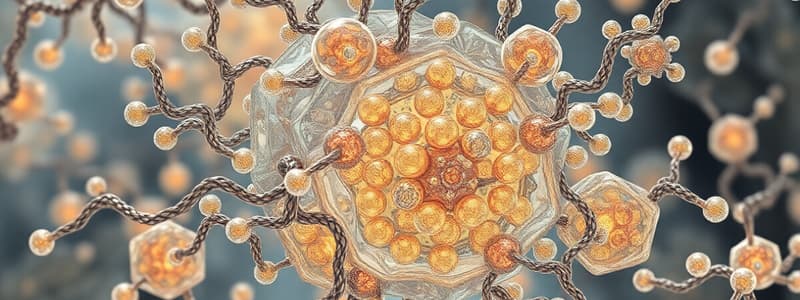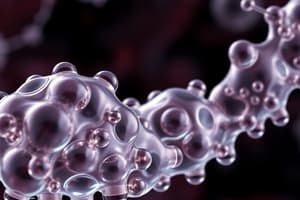Podcast
Questions and Answers
What type of compounds are lipids classified as?
What type of compounds are lipids classified as?
- Synthetic polymers
- Homogeneous compounds
- Polar solvents
- Organic compounds insoluble in water (correct)
Which of the following is an example of a simple lipid?
Which of the following is an example of a simple lipid?
- Steroids
- Triglycerides (correct)
- Glycolipids
- Phospholipids
Why are fats typically solid at room temperature?
Why are fats typically solid at room temperature?
- They are composed primarily of phospholipids.
- They have a higher water content.
- They contain more unsaturated fatty acids.
- They are formed from long-chain fatty acids. (correct)
What is the primary function of lipids in organisms?
What is the primary function of lipids in organisms?
Which of the following is NOT classified under lipids?
Which of the following is NOT classified under lipids?
What is the primary structure of fatty acids?
What is the primary structure of fatty acids?
What happens to fatty acids when they combine with alcohol?
What happens to fatty acids when they combine with alcohol?
What distinguishes waxes from other lipids?
What distinguishes waxes from other lipids?
Which of the following statements is correct about the state of fatty acids?
Which of the following statements is correct about the state of fatty acids?
Which of these fatty acids is mentioned as an example of a component of wax?
Which of these fatty acids is mentioned as an example of a component of wax?
What characterizes saturated fatty acids?
What characterizes saturated fatty acids?
What is a key feature of unsaturated fatty acids?
What is a key feature of unsaturated fatty acids?
What is the typical chain length of fatty acids?
What is the typical chain length of fatty acids?
Which fatty acid is an example of a short-chain fatty acid?
Which fatty acid is an example of a short-chain fatty acid?
How do unsaturated fatty acids affect hydrogen bonding?
How do unsaturated fatty acids affect hydrogen bonding?
Which fatty acid has the longest carbon chain?
Which fatty acid has the longest carbon chain?
What type of fatty acid is oleic acid?
What type of fatty acid is oleic acid?
Which of the following fatty acids is identified with a systematic name that includes 'n-hexadecanoic acid'?
Which of the following fatty acids is identified with a systematic name that includes 'n-hexadecanoic acid'?
What characterizes unsaturated fatty acids?
What characterizes unsaturated fatty acids?
What is the common name of n-dodecanoic acid?
What is the common name of n-dodecanoic acid?
Which fatty acid is known as cw-9-octadecenoic?
Which fatty acid is known as cw-9-octadecenoic?
Which source is associated with Palmitoleic acid?
Which source is associated with Palmitoleic acid?
How many carbon atoms are present in Gadoleic acid?
How many carbon atoms are present in Gadoleic acid?
Which of the following fatty acids has the highest number of carbon atoms?
Which of the following fatty acids has the highest number of carbon atoms?
What characteristic distinguishes polyunsaturated fatty acids from monounsaturated fatty acids?
What characteristic distinguishes polyunsaturated fatty acids from monounsaturated fatty acids?
What characterizes saturated fatty acids?
What characterizes saturated fatty acids?
Which fatty acids cannot be synthesized by the human body and must be obtained through diet?
Which fatty acids cannot be synthesized by the human body and must be obtained through diet?
How do double bonds in fatty acids influence their physical properties?
How do double bonds in fatty acids influence their physical properties?
Which fatty acid example is specifically mentioned as a polyunsaturated fatty acid?
Which fatty acid example is specifically mentioned as a polyunsaturated fatty acid?
What is the significance of including different types of fatty acids in the human diet?
What is the significance of including different types of fatty acids in the human diet?
Which characteristic is true for saturated fatty acids?
Which characteristic is true for saturated fatty acids?
What is the result of saponification of fats?
What is the result of saponification of fats?
Which statement about unsaturated fatty acids is correct?
Which statement about unsaturated fatty acids is correct?
What process can be used to hydrolyze fats into fatty acids and glycerol?
What process can be used to hydrolyze fats into fatty acids and glycerol?
Which property describes the physical state of fats at room temperature?
Which property describes the physical state of fats at room temperature?
Flashcards are hidden until you start studying
Study Notes
Lipids
- A diverse group of organic compounds
- Insoluble in water but soluble in non-polar solvents
- Found in most organisms
- Essential components of cell membranes and hormones
- Include fats, waxes, and some vitamins
- Major energy storage molecules
Simple Lipids
- Esters of fatty acids and alcohols
- Triglycerides are common examples
- Esters of glycerol and fatty acids
Fats
- A type of simple lipid
- Esters of glycerol and fatty acids
- Solid at room temperature
- Chemically, fats are triglycerides
Fatty Acids and Waxes
Fatty Acids
- Long carbon chains (3-36 carbon atoms)
- Liquid in their free state
- Combine with alcohol to form triglycerides
- Naturally occurring fatty acids contain carboxylic acid ($\text{COOH}$)
Waxes
- Esters of fatty acids and alcohols
- High molecular weights
- Beeswax: long chain fatty acid and small alcohol chain
- Examples: palmitic acid [16°C] and myristic palmitate
Fatty Acids
- Saturated Fatty Acids: Unbranched, linear chains saturated with hydrogen atoms
- Unsaturated Fatty Acids: One or more double bonds in the hydrocarbon chain
Saturated Fatty Acids
- Hydrocarbon chain with a carboxyl group at one end
- Saturated with hydrogen atoms
- No double bonds between carbon atoms
Unsaturated Fatty Acids
- One or more double bonds in their hydrocarbon chain
- Fewer hydrogen atoms bonded to the carbons
- Chain length usually between 12-24 carbon atoms
- Examples: butyric acid (C4), caproic acid (C6)
Common Monounsaturated Fatty Acids
- Palmitoleic acid: Found in marine algae and pine oil
- Oleic acid: Found in animal tissue, olive oil, fish oil
- Gadoleic acid: Found in fish oil
- Erucic acid: Found in various sources
- Nervonic acid: Found in shark oil and brain tissue
Polyunsaturated Fatty Acids
- More than one double bond in their hydrocarbon chain
Chemical Properties of Fatty Acids
Saturated Fatty Acids
- Solid at room temperature
- Insoluble in water
- Soluble in organic solvents (petroleum ether, benzene, chloroform)
- Show cis-trans isomerism
- Presence of cis and trans isomers due to double bonds in the chain
Physical Properties of Fats
- Usually liquids at room temperature
- Poor conductors of heat
- Unsaturated fatty acids have lower melting points than saturated fatty acids
- Glycerides with a high percentage of unsaturated fatty acids have lower melting points.
Chemical Properties of Fats & Oils
- Undergo hydrolysis with strong acids, alkalis, or enzymes
Saponification
- Hydrolysis of fats using alkalis like $NaOH$ or $KOH$ yields soap
Hydrogenation
- Unsaturated fatty acids are converted to saturated fatty acids through hydrogenation
- High temperature and catalyst like Nickel are used in the process
Studying That Suits You
Use AI to generate personalized quizzes and flashcards to suit your learning preferences.




